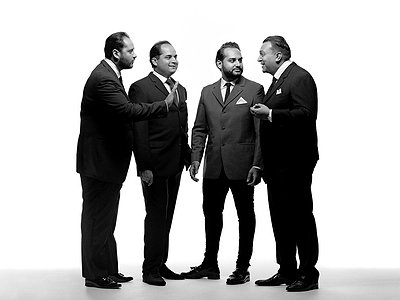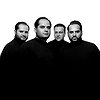Could you take us through a day in your life, from a possible morning routine through to your work? Do you have a fixed schedule? How do music and other aspects of your life feed back into each other - do you separate them or instead try to make them blend seamlessly?
Music is a key component of our life, it is our passion. We try to pass on this passion to our children. Our daily routine starts with breakfast with the family, followed by practice on our own. In the afternoon we rehearse together, and, in the evening, we have concerts. Every day is different since we are on tour quite often; however, we try to find something in every culture or city that we can adopt from for our own life and music.
Could you describe your creative process based on a piece or album that's particularly dear to you, please? Where did the ideas come from, how were they transformed in your mind, what did you start with and how do you refine these beginnings into the finished work of art?
Our ensemble only plays pieces we really love. We discuss them, and everyone puts in, his own personality.
Frantisek puts the basis down on paper and leaves many spaces open for improvisations. Even at concerts, we act spontaneously, that’s why none of our concerts are the same.
The song “Yesterday” by the Beatles, which is on our new album Revolution, was categorized by their label as baroque-pop. We loved this description and connected this masterpiece of pop with Bach’s cello suite, as masterpiece from the baroque age.
There are many descriptions of the ideal state of mind for being creative. What is it like for you? What supports this ideal state of mind and what are distractions? Are there strategies to enter into this state more easily?
It’s mostly about emotions. We try to express our emotions through our music. On the opposite, there is virtuosity, because you can learn that. We had the opportunity to learn techniques from our family, which are not taught at universities. Therefore, we were able to combine those two approaches and create what we like.
How do you make use of technology? In terms of the feedback mechanism between technology and creativity, what do humans excel at, what do machines excel at?
At concerts, we only work with amplification if the hall is too large for an acoustic performance. There is a big difference between the sound of an instrument and the sound which comes through a speaker. But obviously, we use helpful technology for writing scores. Machines don’t have a heart and cannot express feelings and emotions, which music is all about.
Collaborations can take on many forms. What role do they play in your approach and what are your preferred ways of engaging with other creatives through playing together or just talking about ideas?
We love working with many different great musicians. We have collaborated with creative minds like Hans Zimmer, Bobby McFerrin and Julian Rachlin. We also love working with great orchestras, like the Vienna Symphony Orchestra.
How is preparing music, playing it live and recording it for an album connected? What do you achieve and draw from each experience personally? How do you see the relationship between improvisation and composition in this regard?
On stage, we give the audience our energy, and receive it back tenfold. This creates a great circulation of energy. We try to create a fun way of communication with our audience.
How do you see the relationship between the 'sound' aspects of music and the 'composition' and 'performance' aspects? How do you work with sound and timbre?
The musical sound should have many colours. The challenge is to enrich well composed music with colours and effects.
Our sense of hearing shares intriguing connections to other senses. From your experience, what are some of the most inspiring overlaps between different senses - and what do they tell us about the way our senses work? What happens to sound at its outermost borders?
On stage we try be as natural as possible. When you want to have a great show, it is not just about the acoustic stimulation. You have to touch people where they are the most vulnerable – in their heart.
Art can be a purpose in its own right, but it can also directly feed back into everyday life, take on a social and political role and lead to more engagement. Can you describe your approach to art and being an artist?
Music should always try to bring joy and good feelings. It is the international language of every country. Music doesn’t know borders and can unite people.
It is remarkable, in a way, that we have arrived in the 21st century with the basic concept of music and performance still intact. Do you have a vision of music and performance, an idea of what they could be beyond their current form?
Music is inexhaustible, and every era has its own geniuses. From Bach to Mozart, Miles Davis, John Coltrane, the Beatles, on and on.
It is always evolving and that’s what we try to do with our Janoska Style. We try to enrich classical music with improvisation. With our new album Revolution, we are trying to revolutionize classical music, just like the Beatles did with pop-music.



